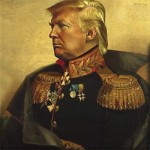Trump’s first criminal trial is about election interference; framing it as “hush money” hides this.
 The former President faces four trials: the one about retaining classified documents involving national security in a Florida court, the one about disrupting vote counting via mob insurrection in DC, one about fake electors in Georgia, and the so-called ‘hush money’ case in New York.
The former President faces four trials: the one about retaining classified documents involving national security in a Florida court, the one about disrupting vote counting via mob insurrection in DC, one about fake electors in Georgia, and the so-called ‘hush money’ case in New York.
This hush-money framing does the case a disservice. It makes it seem lurid and less consequential than those involving the constitutional order of government or divulging intelligence secrets. It presents an intimate, tidy, and contained narrative, which also is false.
Tidy False Narrative: The President and the Porn Star
The tidy narrative is based on a simple affair, perhaps followed by extortion against a Presidential candidate and then payment to remain silent from one to the other. It is a play in three acts told with such reduced resolution that a substantial criminal act or victim is hard to spot. Unless we focus on potential extortion against the candidate or damage to his spouse who remains off stage, the victim in such a telling is mostly missing. What people get is lurid smoke and no fire.
Messy Consequential Narrative: All the News Fit to Hide
However, as facts are added to the indictment, a narrative of collusion between the presidential candidate and a media organization emerges. A leader of the media organization agrees to be the ‘eyes and ears’ of the campaign, to identify, investigate, and, when approved by the candidate, purchase the silence of those alleging affairs. The resulting non-disclosure agreements were between the media organization and those obligated to remain silent. Funds to pay for this would pass through a shell corporation created by the Trump Organization to disguise such payments as business expenses. This is anything but tidy, and its criminal consequences are clear.
Hearing Lachlan Cartwright describe his insider’s view of the National Enquirer’s role in this cover-up brought home an essential truth. This case isn’t about sex; it is about an organized effort by the press and a candidate working together to influence an election.
The primary damage from such actions is the political compromise that would obligate a candidate to a media organization holding the right to publish their secrets. America grants broad press freedoms; this scheme used these powers to buy and bury stories about one candidate while printing false negative news about his competitors.
The candidate and the media organization are mutually corrupting in this messier narrative. It shows an absurdist Fahrenheit 451-like situation in which the media set out to find all the news fit to suppress and buy stories from those willing to tell them to prevent their circulation. Of course, there is no specific law against this. Still, there are general laws about truthfully booking business expenses and laws regulating the size, source, and public disclosure of political donations. Together, they limit election interference, which is the alleged criminal objective in this case.
An indictment isn’t a conviction, but these charges are material in terms of protecting elections from interference and candidates from compromise. This messier narrative raises the need to reform or limit the use of non-disclosure and exclusivity agreements by media organizations seeking to constrain rather than expand public discourse. This isn’t as overt as inciting a mob or stealing secrets, but it addresses an alleged level of corruption that deserves scrutiny.

 The future of digital experiences will be built by strategists who grasp the full array of emerging business, social, and technical models. Specialties in user experience, branding, application design, and data science are laying the foundation for richer user experiences and business models breakthrough products and revenue based marketing.
The future of digital experiences will be built by strategists who grasp the full array of emerging business, social, and technical models. Specialties in user experience, branding, application design, and data science are laying the foundation for richer user experiences and business models breakthrough products and revenue based marketing.
2 Responses to "Trump’s first criminal trial is about election interference; framing it as “hush money” hides this."
March 20, 2025
Agreements regarding fund non-disclosure existed between the media company and individuals required to keep quiet. Payments for this would be channeled through a shell corporation established by the Trump Organization to conceal these transactions as business expenses.
July 17, 2025
The neat storyline is predicated on a straightforward incident, possibly followed by blackmail against a presidential contender and then payment to both parties to keep quiet.